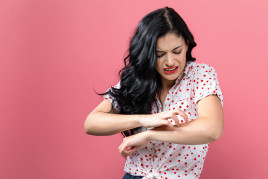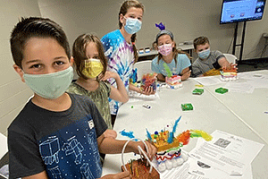Acne scars: Causes
Squeezing, popping, or picking acne increases your risk of developing an acne scar
You can reduce this risk by applying acne medication to the breakout instead of squeezing, popping, or picking at it.

What causes acne scars?
When acne clears, your body starts healing the skin where you had the breakout. Sometimes, the skin heals in 7 to 10 days without leaving a sign.
Acne scars are more likely to develop when you:
Had acne that went deep into your skin, like a deep and painful pimple, such as an acne cyst or nodule. These types of acne cause intense inflammation in the skin, which can cause scarring. In general, the deeper the acne goes into your skin, the more likely it is to cause a scar. However, some people develop acne scars when blackheads or whiteheads clear.
Picked, popped, squeezed, or scratched the acne. Trying to get rid of acne this way can increase inflammation, leading to scarring.
Have a close blood relative who gets acne scars. The genes we inherit can make our skin more likely to scar.
After your skin heals, you may see sunken or raised scars. What type of scar you see depends on how much collagen, which gives skin support, your body makes while healing. Here’s the lowdown on which type of scar will develop:
Depressed (or sunken) acne scars: If your body makes too little collagen, depressions or pits form as your skin heals.
Raised acne scars: When your body makes too much collagen as it tries to heal the skin and underlying tissue, you see a raised scar. These scars are more common in people who have darker skin tones.
Who gets acne scars?
Although we know what increases a person’s risk of developing acne scars, it is not possible to predict who will develop acne scars. Even people who have all the risks listed above may not develop scars. Sometimes, people who don’t have an increased risk can develop acne scars.
If you develop acne scarring, the scars can fade. However, they rarely go away. A board-certified dermatologist can minimize the look of the scars. Newer treatments improve the results that people see after treatment.
To find out how dermatologists treat these scars, go to Acne scars: Consultation and treatment.
Image
Getty Images
References
Jennings T, McLarney M, et al. “Acne scarring-pathophysiology, diagnosis, prevention, and education – Part 1.” J Am Acad Dermatol (2022) [journal pre-proof].
Leung AK, Barankin B, et al. “Dermatology: How to manage acne vulgaris.” Drugs Context. 2021 Oct 11;10.
Soliman YS, Horowitz R, et al. “Update on acne scar treatment.” Cutis. 2018 July;102(1):21-5, 47-8.
Written by:
Paula Ludmann, MS
Reviewed by:
Kesha Buster, MD, FAAD
Sandy Marchese Johnson, MD, FAAD
Desmond Shipp, MD, FAAD
Last updated: 12/8/23
 Atopic dermatitis: More FDA-approved treatments
Atopic dermatitis: More FDA-approved treatments
 Biosimilars: 14 FAQs
Biosimilars: 14 FAQs
 How to trim your nails
How to trim your nails
 Relieve uncontrollably itchy skin
Relieve uncontrollably itchy skin
 Fade dark spots
Fade dark spots
 Untreatable razor bumps or acne?
Untreatable razor bumps or acne?
 Tattoo removal
Tattoo removal
 Scar treatment
Scar treatment
 Free materials to help raise skin cancer awareness
Free materials to help raise skin cancer awareness
 Dermatologist-approved lesson plans, activities you can use
Dermatologist-approved lesson plans, activities you can use
 Find a Dermatologist
Find a Dermatologist
 What is a dermatologist?
What is a dermatologist?